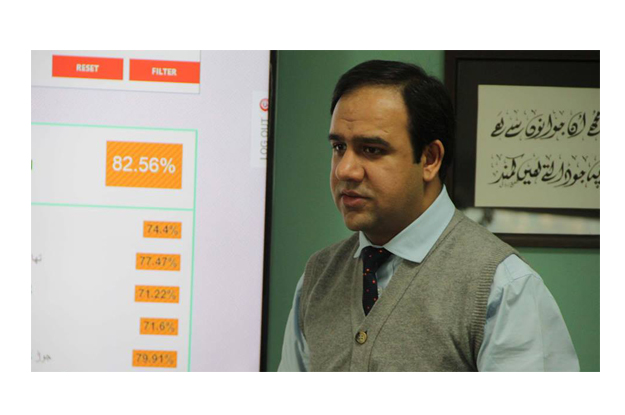
Glass windows on the front edge of the Arfa Kareem Information Technology (IT) Tower’s 11th flour provide a vantage point to view a long stretch of Ferozepur Road and neighbourhoods along its one side. This is not the only view from the floor, however. A room on the 11th floor provides a window onto the crime scene in the province. The room serves as the office of Punjab Information Technology Board (PITB) chairman Umar Saif.
A large LCD fixed on a wall in the room shows crime hotspots in the province. Briefing The Express Tribune, a PITB official said the information displayed on the LCD comes from a comprehensive database maintained by the PITB. He says they have record of 160,000 FIRs in the database. He said the PITB was working on automating records of all 709 police stations in the province.
“The database has information about most commonly reported crimes. It can tell you about the updated number of car thefts in a city,” he said. The database lets you sort information by location and time of the day when a crime had taken place, he adds.
He says automation will let citizens keep track of progress on their complaints. He said the status of complainants could be checked online through a unique identification number issued against them. “The SHO concerned will get three days to either register an FIR on a complaint or explain his reasons for not doing so,” he says.
The official says PITB officials deputed at the police stations are responsible for entering all crime data for the central database.
He says statistics including geographic location of reported crime were compiled every six months and sent to the Police Department for analysis. This is helping them allocate their resources better, he says.
The official says the PITB has also started geo-tagging crime data in four districts. “Investigation officers have been provided with smart phones to take photos at crime scenes and upload them to the database,” he says.
He says work is also underway on surveillance of busy areas in major cities using closed circuit television (CCTV) cameras.
Speaking to The Express Tribune, PITB Chairman Umar Saif says that the Khyber-Pukhtunkhwa government has expressed interest in replicating some of PITB projects for maintenance of law and order and controlling crime.
Saif says the PITB is currently working on 236 projects. “Some of our projects have received international recognition,” he said.
Some of these projects concern public health, education and land record management.
Saif says some PITB projects are helping the government monitor performance of vaccinators and school teachers.
He says the vaccinators are required to take photos of children immunised against preventable diseases and add them to the centralised database. “They can no longer sit at home and draw salaries,” he says. He says that vaccination coverage has gone up from 21 percent to 71 percent.
He says monitoring has helped improve school teachers’ attendance in some areas.
He says monitoring staff is required to visit all 54,000 schools and document key statistics including student and teacher attendance.
The PITB is also working on establishing Citizen Facilitation Centres (CFC) to let people avail miscellaneous services under one roof. The CFCs may be approached to apply for computerised national identity card (CNIC), passports, arms licence, certificates for birth, death, marriage, divorce and domicile.
The PITB is working on a project to introduce electronic stamp papers in a bid to discourage forgery of land record. “Each electronic stamp paper will have a unique identity number associated with its record in the PITB database. The database won’t allow anyone to backdate a document,” he says.
Saif says so far land records of 25,000 revenue villages have been added to the central database.
Published in The Express Tribune, February 16th, 2016.







1732012115-0/Untitled-design-(14)1732012115-0-270x192.webp)









COMMENTS
Comments are moderated and generally will be posted if they are on-topic and not abusive.
For more information, please see our Comments FAQ